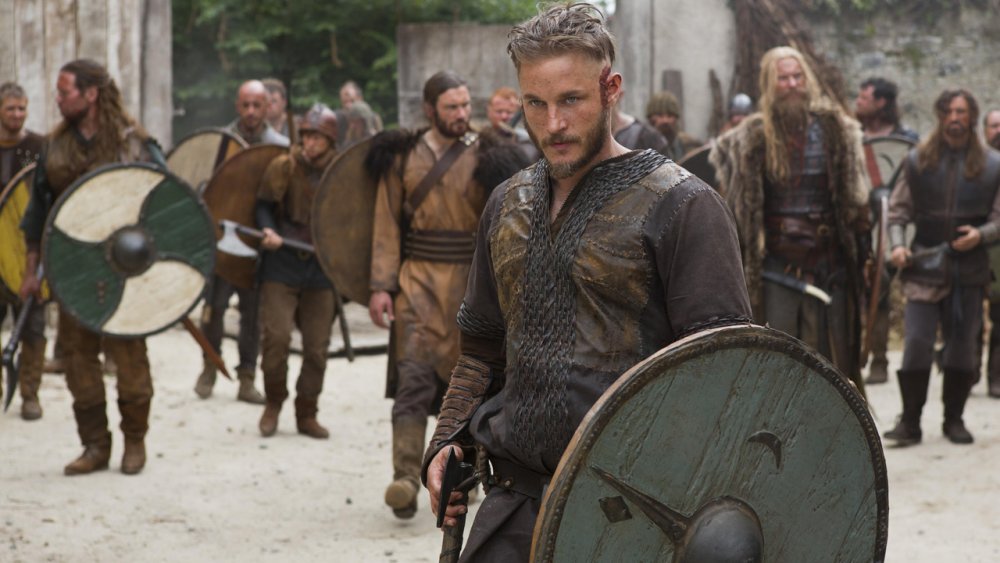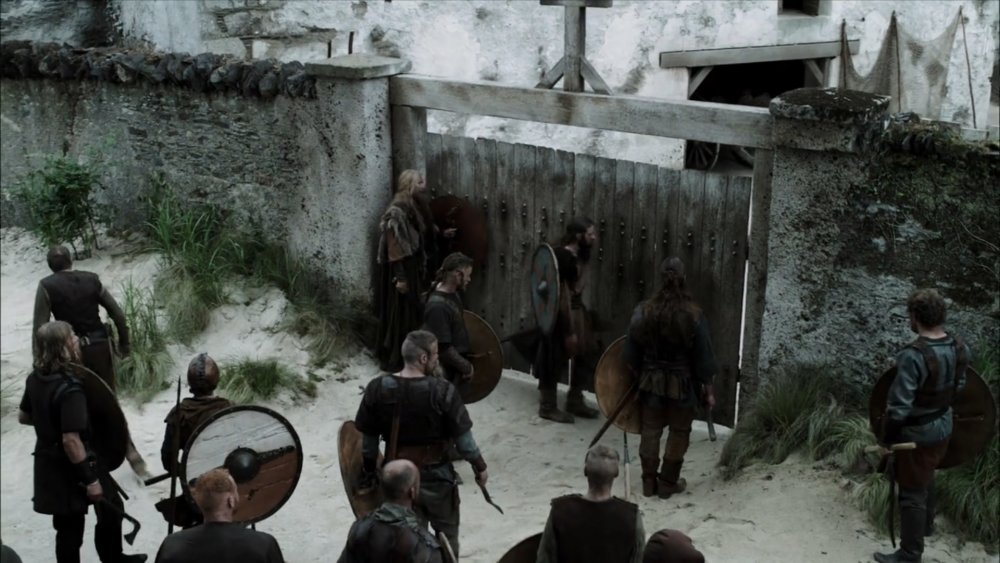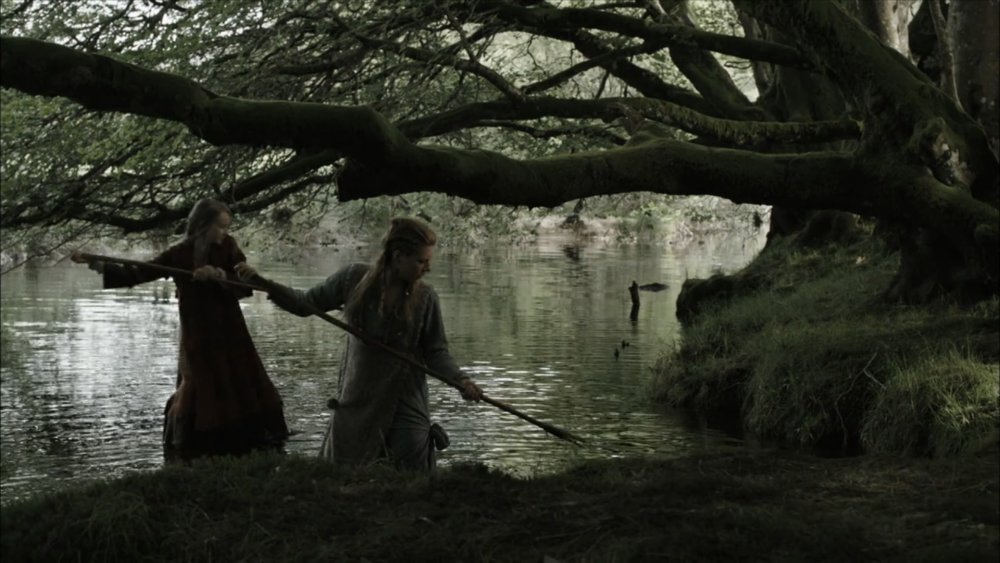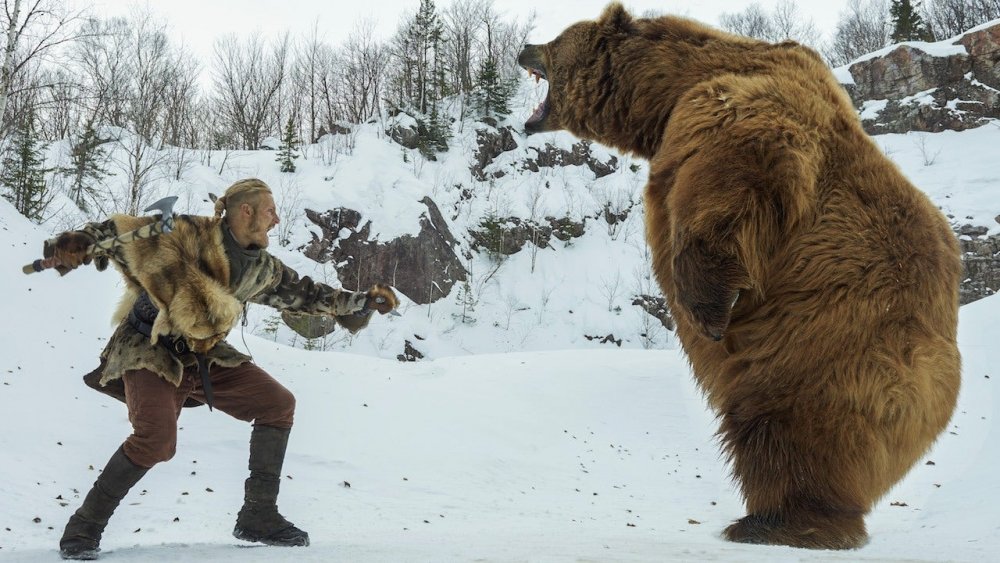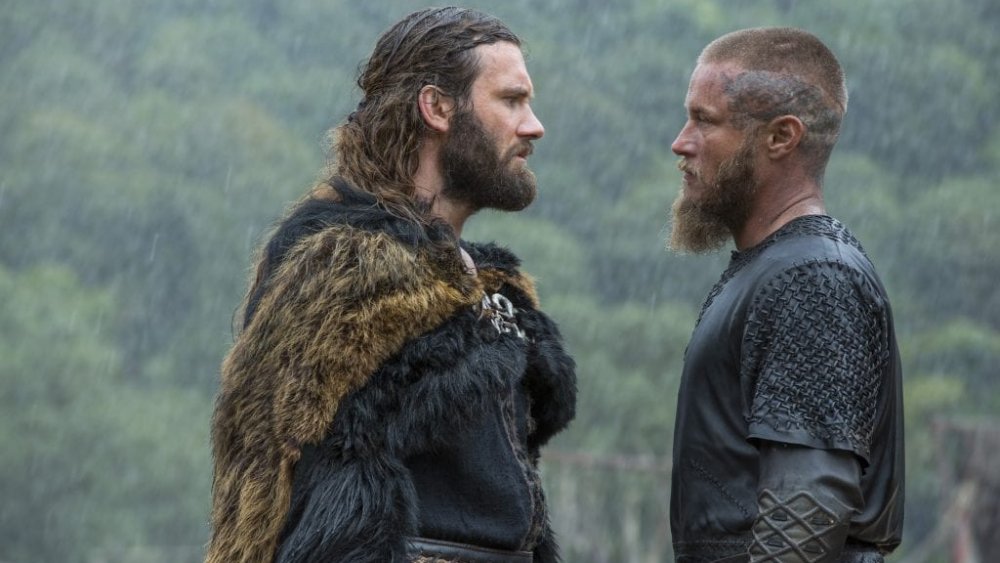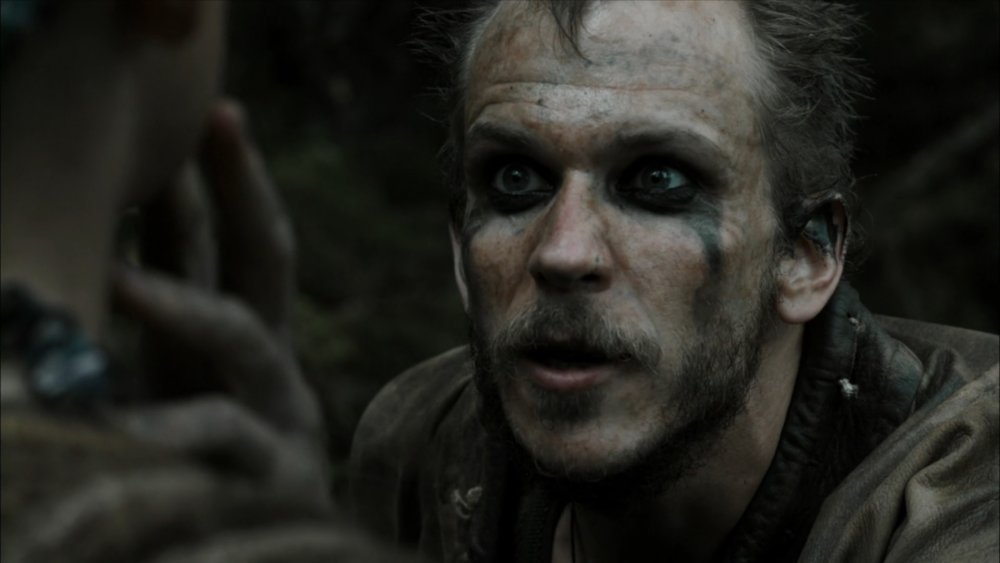Things You Never Noticed On Vikings' First Episode
When the History channel decided to branch out into scripted programming, they didn't take any half measures. Its first foray, Vikings, is a historical drama on a truly epic scale. The show takes place over many decades, features dozens of characters, and hops from Iceland to Russia to the Sahara Desert. Its final batch of episodes promises to bring the series to a towering conclusion, and the upcoming spinoff, Vikings: Valhalla, will no doubt continue the show's grand tradition.
Even colossal things often start small, and that is true in the case of Vikings. Compared to later seasons, the series' first episode feels quaint. It is set in a couple of locations and only prominently features a couple of characters. That doesn't mean it's not packed full of fascinating historic hat tips, premonitions to later events, as well as some early character-defining moments, however. Even on a smaller scale, Vikings is a rich show packed to the helm with detail.
Here are five things you may have missed from the very first episode of Vikings.
Vikings begins at the beginning
For the most part, Vikings tells its story without breaking out of the narrative mode to provide lots of rote historical exposition. Instead, viewers have to look for context clues to place the series' events within the loose historical record.
As the first episode begins, we get a subtitle: Eastern Baltic, 793 A.D. For those of us going into Vikings without much knowledge of medieval history, this is just a helpful way to establish the setting of the show. For those coming into the series with some knowledge about the history of the actual Vikings, that date has a very specific significance.
The year 793 is considered by most historians to mark the beginning of what we now know as the Viking Age. To be more specific, historians consider the Norse raid on a monastery on the island of Lindisfarne, off the coast of Northumberland in the northeast of England, to mark the beginning of this tumultuous era (via History Extra). We see a dramatized depiction of that famous (infamous?) raid on the show's second episode after Ragnar (Travis Fimmel) goes rogue to build his own seafaring ship and travels west, despite Earl Haraldson's (Gabriel Byrne) insistence that they continue to raid the lands to the east. Ragnar's discovery of England and the monastery at Lindisfarne initiates a century of armed conflict between the resident Anglo-Saxons and the Scandinavian raiders covetous of their fertile shores.
In some sense, Vikings really does begin at the beginning.
Lagertha's spear has special significance
Lagertha (Katheryn Winnick) is one of the most enduring and fascinating characters on Vikings. The first time we see her on the show, she is hunting eels with her daughter. During the scene, the camera pans across the water and follows the head of the spear she's using to kill the creatures. Like many characters on Vikings, Lagertha is inspired by a possibly real, possibly legendary (probably some mixture of the two) woman. In those ancient Sagas that inspired the character on Vikings, spears are a recurring motif.
In Lagertha's case, her story is told in a 13th-century history of Denmark called Gesta Danorum, written by the Danish historian Saxo Grammaticus. Grammaticus mostly writes about her in the context of her husband, Ragnar Lothbrok. He indicates that she was Ragnar's first wife and that — in order to win Lagertha's love — Ragnar had to spear a bear to death and strangle a hound that the fierce woman kept to protect her. In another charming chapter from her life, Lagertha is said to have murdered her powerful husband (not Ragnar) with a spearhead she had concealed in her clothing. With him out of the way, Lagertha took on his titles and ruled the land he controlled (via Ancient History Encyclopedia).
We see a very similar event on Vikings, when Lagertha stabs her would-be husband Kalf (Ben Robson) with a knife she has concealed in her sleeve in order to consolidate her power as the Earl of Hedeby. While Kalf's death doesn't come at the end of Lagertha's spear, that first image of Lagertha spearing eels is a nice Easter egg for anyone familiar with the popular symbolism of the shield-maiden's mythology.
The first connection between Bjorn and bears is made on the Vikings' premiere episode
Speaking of Ragnar and Lagertha's bear-stabbing, hound-strangling courtship, Ragnar tells a familiar story to his son, Bjorn (Nathan O'Toole), in the first episode. Bjorn seems mildly amused by the story at the time, but it's possible that it struck a deeper chord with him later in life when he kills a bear himself.
On the season 4 episode "Mercy," a grown-up Bjorn (Alexander Ludwig) goes into the wilderness alone to spend the winter fending for himself in order to prove to Ragnar that he has the strength to be a leader. While decamped at a remote cabin, Bjorn encounters a ferocious bear that has escaped an animal trap he set. After tracking it down, he does battle with the animal, emerging victorious, if a bit slashed up. Bjorn never explicitly ruminates on the symbolism of killing the bear, but based on the stoic gravity of how the event is portrayed on the show, it's clear that it has meaning to him beyond the fact that it was a brush with death. Like his father before him, Bjorn now has a major life event associated with killing a bear.
To tie all that up in an even neater bow, in many Scandinavian languages "bjørn" is the word for bear.
Ragnar and Rollo's brotherly rivalry starts early
One of the most complex relationships on Vikings is the one between Ragnar and his brother, Rollo (Clive Standen). We are introduced to Rollo on the first episode, and although he has all the skepticism of an older brother, he encourages Ragnar's desire to set out on his own to explore the west. Later on the show, Rollo's betrayal of Ragnar will place the brothers on opposing sides in a series of armed conflicts. Careful viewers will have seen this twist coming right from the start.
This dynamic is teased toward the end of the first episode. The two budding warlords are discussing Ragnar's plan to sail west, when Rollo lays out the condition under which he'll join his brother: "I won't go under your command. I won't go unless we're all equal."
Ragnar replies, "We're brothers. You and I will always be equal." Ragnar's statement ends up being fairly accurate. Unfortunately, the brothers only find true equality as rivals.
Floki predicts Bjorn will surpass his father
Another statement made on the first episode that has the ring of truth comes courtesy of Floki (Gustaf Skarsgård). Ragnar takes Bjorn to meet the eccentric shipbuilder, who is working on a boat strong enough to carry Ragnar across the open ocean to the lands he's heard about in the west. When Floki is introduced to Ragnar's son, he gazes into the young man's face and says, "You have your father's eyes, unfortunately."
When Ragnar asks him to explain, Floki clarifies, "It means he will be like you, and that he will want to do better than you, and you will hate him for it."
Although Bjorn works with Ragnar and supports his father's endeavors for most of their lives together, there is a crucial moment wherein he decides to forge his own path. In the fourth season, Ragnar invites Bjorn and the men who are loyal to him to travel with Ragnar back to England, the location of many of Ragnar's most famous conquests. Bjorn declines, choosing instead to sail south to explore the Mediterranean. This ends up being the last time they see each other. Ragnar goes back to England, where he's captured and killed by King Aelle (Ivan Kaye). Meanwhile, Bjorn sails to the Mediterranean where he establishes political and trading connections, expanding the footprint of the Vikings far beyond what Ragnar was able to accomplish in his own lifetime.
Whether or not Ragnar came to hate his son for his ambitions, it's clear that Bjorn did indeed endeavor to do better than his father. It's just one of the many small ways that the first episode of Vikings clued viewers into where the show would take its story and characters.
